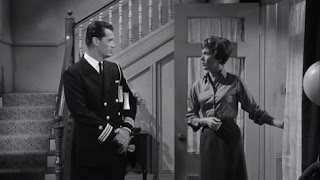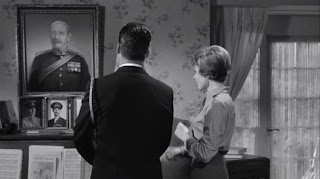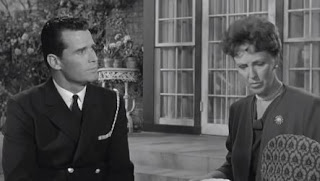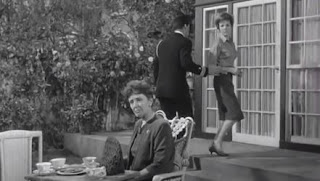 The Story: This is a tough one. And, by the way, Happy Memorial Day.
The Story: This is a tough one. And, by the way, Happy Memorial Day.I've been sitting on this scene from The Americanization of Emily for awhile, trying to think of the best time to post it. I was thinking around D-Day—June 6th—as that WWII event is depicted in the film, but it didn't seem right, somehow.
But, Memorial Day, that's right on the nose...maybe too much. It's the day we honor our war dead—hopefully, we recall their sacrifice over the barbecues—and think about "the last full measure of devotion" that sacrifice represents. That's not something to be taken lightly...or dismissed...ever.
And it should not...ever...be taken for granted, thought of as the cost of doing business, or as "acceptable" losses. Or "the way things are."
That's the point of the scene. Admitted coward Lt. Cmdr. Charlie Madison knows war, survived it, and never wants to experience it again. More importantly, he dreads that his younger brother might get so swept up in the cause that he will enlist, and possibly not survive, and for that, he will have none of the sentimentalization and blithe acceptance of the status quo, none of the ribbons, none of the speeches, none of the Memorials. It makes war too glamorous, too attractive and something to aspire to. Such thoughts kill people.
It would be easy to let people live with their dreams, coping mechanisms, reassurances, justifications and excuses. It's a bitter truth pill to say that the reality might be healthier, not only for mental health, but also for all children approaching 18.
Paddy Chayevsky, he of Network, Marty, and The Hospital, as was typical for him, wrote the scene with a sophistication and bitter humor that blunts the radicalism of what's being said. His monologists never seem like "cranks" because their arguments are well thought-out, articulate, and, even though they may expose your worst fears, at their core, reasonable. There may be cruelty here, but for Madison, it's "life or death" and that requires a hard dose of reality, without illusion.
Maybe the best memorial is to cast illusion aside and vow to prevent such things, so that we need never chisel another name on another memorial, and tend to the ones who've come back from the last failure to do so.
The Set-Up: Lt. Cmdr. Charlie Madison (James Garner) is a "dog-robber"—a procurer—for the U.S. Navy stationed in England during WWII, and specifically for Admiral Jessup (Melvyn Douglas). It's a good job, but, more importantly, it keeps him out of combat. He has made the acquaintance of one Emily Barham (Julie Andrews), a member of the motor pool, and they have become infatuated with each other, despite him being American—but, as she's lost her father, brother, and husband to the war, she's happy that he's breathing. Things are moving along nicely—Emily has invited Charlie to meet her mother (Joyce Grenfell).
Bing! Bong!
CHARLIE: Hello, Emily.
EMILY: Hello.
EMILY: You're just in time for tea.
CHARLIE: Thank you.
EMILY: You brought me some chocolates?
CHARLIE: Two boxes of Hershey's.
EMILY: That's very American of you, Charlie. You just had to bring along some small token of opulence. I don't want them.
EMILY: You Yanks can't even show affection without buying something.
CHARLIE: Don't get into a state over it. I thought you liked chocolates.
EMILY: I do! But my country's at war... and we're doing without chocolates for a while. I don't want oranges or eggs or soap flakes, either.
EMILY: Don't show me how profitable it'll be to fall in love with you, Charlie. Don't Americanize me.
EMILY: That's my father. He lost a leg in the first war.
EMILY: Got the Victoria Cross for that. He died in an air raid a week after that portrait was painted.
EMILY: That's my brother, there. His name was Charlie, too, by the way.
EMILY: He was shot down during the blitz. Sacrificed himself to save his squadron.
EMILY: The one you're looking at now is my husband.
CHARLIE: He looks like a rake.
EMILY: Yes. He was very bawdy. I was insane about him.
EMILY: He died at Tobruk.
EMILY: The rest of the lot there are cousins. There's two of them still living.
EMILY: I must say the family's been thinned out nicely one way or another.
EMILY: Charlie, before we go out to my mum, I must tell you... she's a bit mad. You'll like her very much. She's very funny.
EMILY: But she may yatter away about my father and my brother... as though they were still alive. Just go along with her. Do you understand?
CHARLIE: I understand. You don't want my Hershey bars.
EMILY: I think it profane to enjoy this war.
CHARLIE: I never realized what a sensual satisfaction grieving is for women.
EMILY: I'm not sure that's a very tasteful thing for you to say.
CHARLIE: I'm not sentimental about war. I see nothing noble in widows.
EMILY: You're jealous of my husband. I like that.
EMILY: Mother.
MRS. BARHAM: You've brought chocolates, two whole boxfuls. What a treasure trove.
EMILY: I already refused them. -
CHARLIE: On ascetic grounds. -
MRS. BARHAM: You're an absolute flatulent, Emily.
EMILY: Take the things if you want them.
MRS. BARHAM: I shall have one later and save the rest for your father.
EMILY: Hello.
EMILY: You're just in time for tea.
CHARLIE: Thank you.
EMILY: You brought me some chocolates?
CHARLIE: Two boxes of Hershey's.
EMILY: That's very American of you, Charlie. You just had to bring along some small token of opulence. I don't want them.
EMILY: You Yanks can't even show affection without buying something.
CHARLIE: Don't get into a state over it. I thought you liked chocolates.
EMILY: I do! But my country's at war... and we're doing without chocolates for a while. I don't want oranges or eggs or soap flakes, either.
EMILY: Don't show me how profitable it'll be to fall in love with you, Charlie. Don't Americanize me.
EMILY: That's my father. He lost a leg in the first war.
EMILY: Got the Victoria Cross for that. He died in an air raid a week after that portrait was painted.
EMILY: That's my brother, there. His name was Charlie, too, by the way.
EMILY: He was shot down during the blitz. Sacrificed himself to save his squadron.
EMILY: The one you're looking at now is my husband.
CHARLIE: He looks like a rake.
EMILY: Yes. He was very bawdy. I was insane about him.
EMILY: He died at Tobruk.
EMILY: The rest of the lot there are cousins. There's two of them still living.
EMILY: I must say the family's been thinned out nicely one way or another.
EMILY: Charlie, before we go out to my mum, I must tell you... she's a bit mad. You'll like her very much. She's very funny.
EMILY: But she may yatter away about my father and my brother... as though they were still alive. Just go along with her. Do you understand?
CHARLIE: I understand. You don't want my Hershey bars.
EMILY: I think it profane to enjoy this war.
CHARLIE: I never realized what a sensual satisfaction grieving is for women.
EMILY: I'm not sure that's a very tasteful thing for you to say.
CHARLIE: I'm not sentimental about war. I see nothing noble in widows.
EMILY: You're jealous of my husband. I like that.
EMILY: Mother.
MRS. BARHAM: You've brought chocolates, two whole boxfuls. What a treasure trove.
EMILY: I already refused them. -
CHARLIE: On ascetic grounds. -
MRS. BARHAM: You're an absolute flatulent, Emily.
EMILY: Take the things if you want them.
MRS. BARHAM: I shall have one later and save the rest for your father.
MRS. BARHAM: You must be Emily's new lover
since she hasn't bothered to introduce us.
CHARLIE: You must be her mother.
MRS. BARHAM: You found the chink in my armor. What are your religious views? -
CHARLIE: I'm a practicing coward. -
MRS. BARHAM: That's very fervent of you.
EMILY: I should have known you two would get on. You're as dotty as she is, Charlie.
CHARLIE: Before the war, I was an assistant night manager...of a diplomatic hotel in Washington, D.C.
EMILY: What made you say that? Lord, I feel like Alice at the tea party.
MRS. BARHAM: He's going to tell us about a religious experience.
CHARLIE: Yes.
CHARLIE: It was my job as assistant night manager to arrange things... for many of the great historical figures on great historical missions.
MRS. BARHAM: What exactly did you arrange?
CHARLIE: Usually I arranged girls, but individual tastes varied, of course.
MRS. BARHAM: Of course.
CHARLIE: It's useful work, anyway, especially in a war. I was offered all sorts of commissions in the Army and the Navy. The one I have now. Adm. Jessup phoned me to join his staff... but I'd always been a little embarrassed by my job at the hotel...
CHARLIE: ...and I wanted to do something redeeming.
CHARLIE: (Did you ever notice that) War is the only chance a man has to do something redeeming. That's why war is so attractive. -
MRS. BARHAM: War's very handsome, I agree.
CHARLIE: At any rate, I turned down Adm. Jessup's offer... and I enlisted in the Marines as a private. I even applied for combat service. My wife...
CHARLIE: ...to all appearances a perfectly sensible woman...
CHARLIE:...encouraged me in this idiotic decision. Seven months later, I found myself invading the Solomon Islands. There I was splashing away in the shoals of Guadalcanal. It occurred to me a man could get killed doing this kind of thing.
CHARLIE: Fact is...
CHARLIE: ...most of the men splashing along with me were screaming in agony and dying like flies.
CHARLIE: Those were brave men dying there. Peacetime, they'd all been normal, decent cowards...frightened of their wives, trembling before their bosses...
CHARLIE:...terrified of the passing of the years.
CHARLIE: But war had made them gallant. They had been greedy men. Now they were self-sacrificing. They had been selfish. Now they were generous. War isn't hell at all. Man at his best. The highest morality he's capable of.
EMILY: Never mind all that. What's this about a wife?
CHARLIE: That night, I sat in the jungles of Guadalcanal... waiting to be killed, sopping wet.
CHARLIE: It was then I had my blinding revelation.
MRS. BARHAM: Ah!
CHARLIE: I discovered I was a coward. That's my new religion.
CHARLIE: I'm a big believer in it. Cowardice will save the world.
CHARLIE: It's not war that's insane, you see.
CHARLIE: It's the morality of it. It's not greed and ambition that makes wars. It's goodness. Wars are always fought for the best of reasons... for liberation or manifest destiny... always against tyranny and always in the interest of humanity. So far this war we've managed to butcher... some 10,000,000 humans in the interest of humanity. Next war, it seems we'll have to destroy all of man... in order to preserve his damn dignity.
CHARLIE: It's not war that's unnatural to us. It's virtue. As long as valor remains a virtue we shall have soldiers. So I preach cowardice. Through cowardice, we shall all be saved.
MRS. BARHAM: That was exalting, Commander. Absolutely occult.
EMILY: Yes, well, never mind the metaphysics, Commander. Let's get back to your wife.
CHARLIE: Needless to say, that first night, I wrote Adm. Jessup, saying... "For heaven's sakes, get me out of this. "
CHARLIE: Two weeks later, I was transferred back to Washington. I raced home to my wife... -
CHARLIE: And found her with another man. -
EMILY: Oh Good
CHARLIE: Lord, no. My wife, who had deceived me more times before the war than I care to think about was now having the time of her life being faithful.
CHARLIE: She was furious with me for coming back. There was no reason for her being virtuous anymore.
CHARLIE: She promptly sued me for divorce on the grounds of religious differences.
CHARLIE: I was a self-preservationist... and she was a high Anglican sentimentalist.
EMILY: Well...
EMILY: You're fair game, then.
MRS. BARHAM: After every war, you know, we always find out how unnecessary it was...
MRS. BARHAM: ...and after this I'm sure all the generals will write books about the blunders made by other generals and statesmen will publish their secret diaries...
MRS. BARHAM: ...and it'll show beyond any shadow of doubt that war could easily have been avoided in the first place.
MRS. BARHAM: The rest of us, of course, will be left with the job of bandaging the wounded and burying the dead.
CHARLIE: I don't trust people who make bitter reflections about war, Mrs. Barham.
CHARLIE: It's the generals with the bloodiest records... who are the first to shout what a hell it is.
CHARLIE: It's always the war widows who lead the Memorial Day parades.
EMILY: That was unkind, Charlie, and very rude.
CHARLIE: We shall never end wars, Mrs. Barham, by blaming it on ministers and generals...or warmongering imperialists or all the other banal bogeys.
CHARLIE: It's the rest of us who build statues to those generals... and name boulevards after those ministers. The rest of us who make heroes of our dead... and shrines of our battlefields.
CHARLIE: We wear our widow's weeds like nuns, Mrs. Barham... and perpetuate war by exalting its sacrifices.
CHARLIE: My brother died at Anzio.
EMILY: I didn't know that, Charlie.
CHARLIE: Yes. An everyday soldier's death, no special heroism involved.
CHARLIE: They buried what pieces they found of him.
CHARLIE: But my mother insists he died a brave death and pretends to be very proud.
MRS. BARHAM: You're very hard on your mother. It seems a harmless enough pretense to me.
CHARLIE: No, Mrs. Barham.
CHARLIE: No. You see, now my other brother can't wait to reach enlistment age. -
CHARLIE: That'll be in September. -
MRS. BARHAM: Lord.
CHARLIE: Maybe ministers and generals blunder us into war, Mrs. Barham... the least the rest of us can do is to resist honoring the institution.
CHARLIE: What has my mother got for pretending bravery was admirable? She's under constant sedation... and terrified she may wake up one morning... and find her last son has run off to be brave.
MRS. BARHAM: No.
MRS. BARHAM: You better push off, Emily, if you've got to get to work.
EMILY: Give my best to Father, then.
MRS. BARHAM: Your father died in the blitz... and your brother died a brave and pointless death in December 1940. -
MRS. BARHAM: I've carried on much too long with all this. -
EMILY: Mother.
MRS. BARHAM: No, do go. Honestly, I'd much rather be alone. Really, I mean it.
MRS. BARHAM: You're a kind man, Commander.
MRS. BARHAM: I hope you'll come again.
CHARLIE: Thank you, ma'am. I'd like to.
The Americanization of Emily
Words by Paddy Chayefsky
Pictures by Philip H. Lathrop and Arthur Hiller.
The Americanization of Emily is available on M-G-M Home Video.
























































































































No comments:
Post a Comment